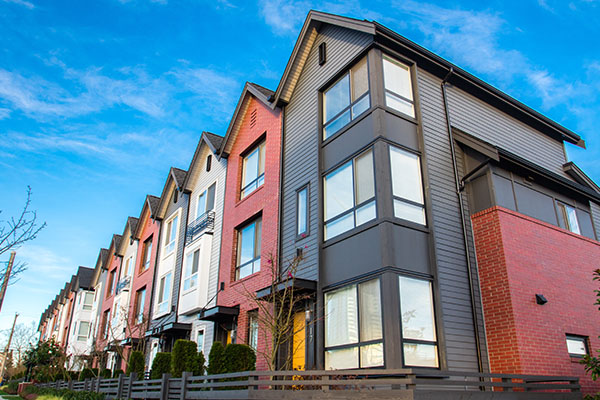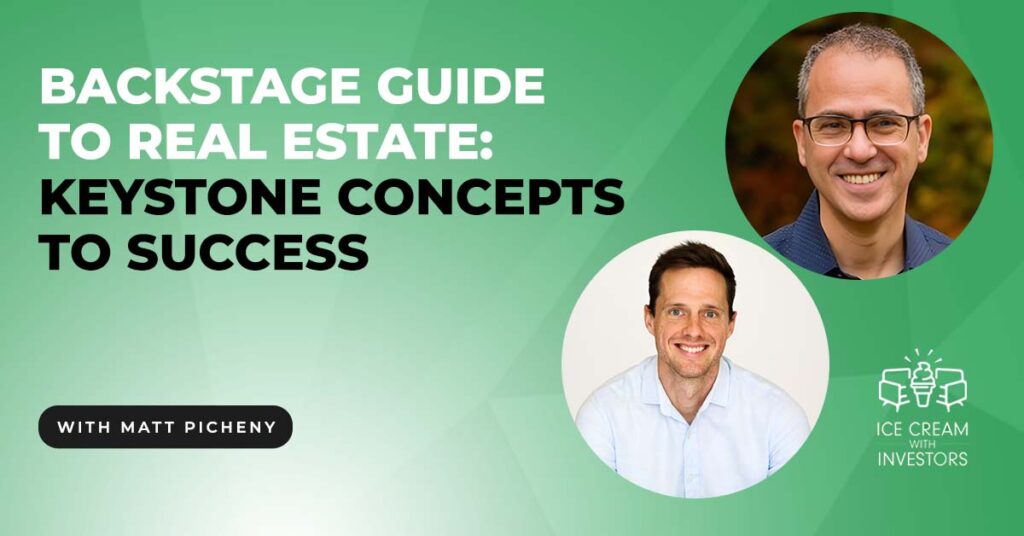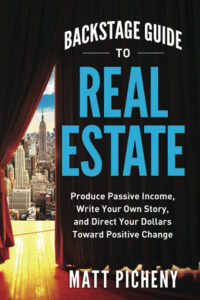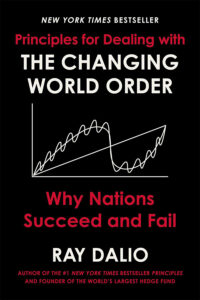A failed company. A Robert Kiyosaki book. Hamilton’s My Shot. All of these combined to create Matt Picheny’s success in real estate. With the challenges and the right motivation, he stumbled into real estate investing and the path to financial freedom. In this episode, he joins Matt Fore to share with us his journey along with his #1 best-selling book, Backstage Guide to Real Estate. He talks about how he made the decision to invest full-time, utilizing both active syndication and passive investing. Combining both his experience as an actor and real estate, Matt came up with the keystone concepts that helped him along the way. He shares those with us in this conversation while also breaking down some of the common misconceptions in the industry, what makes a good operator, and how he is navigating the current choppy markets.
Guest Links
Matt’s Website: Picheny.com
Matt’s LinkedIn: Linkedin.com/in/picheny
—
Watch the episode here
Listen to the podcast here
Backstage Guide To Real Estate: Keystone Concepts To Success With Matt Picheny
On the show, we have Matt Picheny. He is a full-time real estate investor based out of Brooklyn, but that is not where he got to start. He got to start on the stages of Broadway before moving into project management roles and becoming a full-time real estate investor. In his book, Backstage Guide to Real Estate, he highlights keystone concepts that we can all learn about real estate and wealth. In this episode, he highlights three of those concepts. Stick around and read how Matt’s journey from the stages of Broadway to becoming a full-time real estate investor and the challenges he faced along the way.
—
Matt, welcome to the show.
Thanks for having me, Matt. It is a pleasure to be here.
We like to start with the difficult questions. What is your favorite ice cream?
I have been dreading that. I feel like the rest of this interview will go great. How do you pick a favorite ice cream? I live in Brooklyn, New York, and there is a company here called Ample Hills Creamery. They made random things. I hear they make it sometimes, but it is hard to find, this pistachio ice cream that is incredible, and it has caramel in it. It is unique, amazing, and rare to find. I will go with that one. There are many to choose from. It is hard to make a decision.
Is Ample Hills still a creamery in Brooklyn?
It is. They have a couple of locations around the area where I live. I believe that it is no longer owned by the people who used to own it. It has been purchased by a company, and that is why maybe I can’t find that pistachio, but it is still there. It is still delicious.
I love New York City. The next time I’m up that way, I will make sure to go find it.
If you are going to Ample Hills, let me know. I will go with you.
Tell our readers, what is the scoop? What do you do now?
I’m a real estate investor, but I didn’t start off that way. I started off as an actor. I grew up in Orlando, Florida, and I moved to New York to pursue a career in theater. I was a professional actor for five years. I was in fifteen different productions all across the United States. I was doing some computer stuff here and there. This is the mid to late ‘90s. Instead of waiting tables at the Hard Rock Cafe in between acting gigs, I was doing HTML.
More work came in, and I eventually ended up starting my own boutique agency. In the late ‘90s, I had my own agency. It was a small agency. I had five employees. We were doing websites, and things were great. 2001 came along, and the dot-com bubble burst. All my clients went out of business or weren’t spending money on digital marketing. My business is completely imploded. It was bad.
I was fortunate enough to get a phone call right at that time from my landlord who told me I had 90 days to get out of the apartment I was living in. Here I am with no job, a business that has completely failed, and nowhere to live. I had to find a place to live. I was looking to rent something. I ended up searching all over New York and I found a place up in Washington Heights, which is Manhattan, but it is Upper Manhattan. It’s way up North. I found a place and I bought it. I was able to make a purchase. A little less than two and a half years later, I sold that property. I saw my initial investment in the property more than quadruple in value. I was like, “How do I make that happen again?”
I was making a good salary at that time, but that one transaction was more than my whole year’s worth of salary. That is what set me down the path of wanting to figure out what is this real estate investing game and how I get involved. I did, for several years, doing that as a hobby, with small little projects here and there.
Several years ago, my wife got a cool job opportunity in Miami, Florida. We moved to Miami. When we made that move, that is when I transitioned from doing real estate as a hobby on the side to becoming a full-time real estate investor. That is what I do now. Two-thirds of my portfolio are deals that I’m investing passively in some limited partners and other people run those deals. A third of my portfolio, almost 4,000 units, are deals that I am the general partner on. I’m actively involved in those deals and making sure that they are running smoothly.
I want to go back to their first purchase there. New York is historically known for being a very expensive place to go purchase a home, specifically the first home. Why did you decide to make that decision? What type of home was it? Was it single-family or multifamily?
I bought an apartment in a co-op building. For those who don’t know what it is, co-op is like a condo. Technically, you are investing in a company, and you are given a proprietary lease, which gives you exclusive access to your unit, but you are not buying the unit. It is weird. That was the first purchase that I made. It turned out to be a good investment. The investment was good because of the timing. The real estate market was doing well in New York at that time.
I bought an apartment in a part of town that was rapidly being developed right before I moved in there. They opened up a Starbucks around the corner. There were things happening in that area. Because of the work that I did at the property, I instinctively fixed up the unit because there were cracks in the walls. It needed some paint and things like that, but the building itself needed work. It looked super dated.
I spoke to somebody who was on the co-op board, and it turned out that they happened to be forming a committee. They asked me if I wanted to be on it. I was on this committee, and we hired an interior designer. We redid the lobby, hallways, elevators, and everything. The place looked way better than when I bought it. All those factors combined helped lift the value of that property.
You are doing value add before value add was cool.
I talk about it in the book. I found out about value add, and I realized I had instinctively been doing it for a few different things that I had worked on before I knew it was a thing.
You moved down to Miami, decided to go real estate full-time, and moved away from some of the project management digital services you were providing. Do you remember what year that was?
We moved down in September 2015. I first moved down there thinking I was going to get a job in the digital marketing advertising world. That was my initial intention. The first 3 to 4 months that we were down there, I was banging my head against the wall. It was weird because in New York, having been here so long, I got recruited out of one company into another out of another. That is how it happened. I don’t think I ever was looking for a new job. I would end up getting a phone call from a recruiter with this awesome opportunity and end up taking it.
In Miami, I had no network. None of the companies that were in New York had anything down there. It was trying to break into new territory, but honestly, I was burned out. I had been doing the New York City grind for eighteen years. I didn’t want to do it anymore. I had been doing real estate successfully as a hobby for several years. I wanted to do that. I was listening to an Audiobook, Robert Kiyosaki’s Rich Dad Poor Dad.
My big takeaway was, “I need to create these multiple streams of passive income. Real estate is good for that. Here I have been doing the real estate thing, but no, I’m going to get a job in the advertising world.” I’m also listening to the cast album of Hamilton because we are huge fans of Hamilton. We also invested in it. It was a whole other story that we can talk about but I’m listening to Hamilton and there is a song called My Shot. We are talking about taking a shot, and the whole casts were like, “Take a shot,” in the background. I was like, “What am I doing? Why am I trying to get a job in advertising? I don’t want to do it. I’m burned out. I need to take my shot and do this real estate thing full-time.” That is what I did. Fortunately, it has worked out pretty well for the past several years. It has been good.
Do you remember roughly what your portfolio looked like at that time? Were you still doing active fix and flips? Did you have some passive investing? What did all that look like?
At that time, when I sat down with my wife and said, “Starting January 1st, 2016, I’m going to be a real estate investor. What do you think?” We had two streams of passive income with one that was potential. We had a townhouse that my wife and I had bought about a year and a half prior in Brooklyn, which was an awesome deal. I knew when we bought it that if we ever moved out, it would cashflow. It cashflowed nicely. We had that as one stream of passive income.
I had a property that I had bought. After the place in Washington Heights, I bought a place on the Upper West Side. That was my primary residence. That is when I bought my first investment. It was a piece of property up in Connecticut that I ended up developing and creating a single-family home. It was almost an acre of land that I bought.
That was going to be a vacation home. I thought I would rent it out at the very beginning. I was like, “That helped to frame my costs a little bit.” It ended up being that. I rented it the whole time. I never was up there more than a weekend here or there, but it was a rental. That deal never cashflowed. I was about break even every year, but it was never underwritten to do that. I thought, “I got the townhome in Brooklyn. The Connecticut house, maybe I can make that cashflow positive, eventually. Who knows how long but I have a 30-year fixed mortgage, so over time, rent would go up.”
We had invested in Hamilton. It is still doing well to this day. We had passive income coming from there. That was my portfolio at that time. I would buy properties. I bought some single-families, but those were more like fix and flips. The portfolio that I had at that time when we moved down was those three passive investments.
You had three, but you had been doing these projects where you would get a lump sum of cash along the way. Do I understand that correctly?
The projects that I had been doing were much smaller. By the time I got involved and we had moved down to Florida, that is when I started doing fix and flips and all that stuff. The large chunks of change were not large. The large lump sums weren’t large. Sometimes they were, and sometimes they were negative. I learned quickly that I didn’t want to continue doing that. I wanted something that was a little more predictable, stable, and steady.
With flipping properties, it is hard to find them, especially nowadays and even back then. All those shows that are out there, everyone thinks they can flip properties. The problem is the properties get bit up, and it is hard to find a good deal. If you find a good deal, you have to do everything, sell it, and you are done. If I wanted to replace the salary I had previously worked, it’s way more than 9:00 to 5:00, I probably was going to need to flip a property every month or every other month.
Everyone thinks they can flip properties. The problem is the properties get beat up, and it’s really hard to find a good deal. When you do find a good deal, you have to do everything.CLICK TO TWEET
It is hard to do.
How am I going to get that and how many construction crews am I going to hire? I hired some guy who did construction stuff and fixed the houses. He didn’t have a crew like, “How was I going to be doing more than one at any given time?” I was living in Miami. I wasn’t doing this in Miami. The price point in Miami didn’t make sense for me. I was doing this in Ohio. I have relatives that live in the Akron, Cleveland area. That area is where I was flipping these properties so it wasn’t in my backyard. It was not an easy thing to do.
I got started finding out about real estate syndications, where investors are pooling their money together and go after these investments. I started investing in those and doing both paths at the same time. I was looking to be an active investor and be a general partner in those deals and run those deals but also looking to invest passively.
The passive stuff was easier to do because all I needed to do was find a deal that I felt comfortable with. I invest in those. I invested in five deals before I sponsored my first deal. It took me two years to find my first deal to sponsor. I knew that once I had a deal that I was going to sponsor, I wasn’t going to only be into that deal for a few months and be out of it. In these types of deals, we have been underwriting them for 5 to 7 years.
The real estate market has been incredibly robust over the past several years. I don’t think I have had a deal that I have been in on the multifamily for three years. I have been evolving through the years as an active. There are some passive ones that have been longer, but the plan is that these things are going to last 5 to 7 years.
Instead of hunting for that one property to flip to make a little bit of money that I’m only going to be working on for 3 to 6 months, what if I take that same amount of time and energy and put it into trying to find multifamily. It turns out even longer to find multifamily deals but that deal is something that I can work on for five years, get more over time, and build up a portfolio.

Real Estate: These things are going to last five to seven years. Instead of hunting for that one property to flip, what if I take that same amount of time and energy and put it into trying to find a multifamily?
It is a common misconception out there that active real estate syndications, investors, flippers, or wholesalers don’t also passively invest. You and I are similar there where I have got an active portfolio that I actively manage, syndicate, and run, but I also have a passive portfolio. Can you talk to us a little bit about if you were flipping houses or doing things in Northeast Ohio and also trying to get involved in real estate syndications, did you decide to invest passively? I want to go into how you determine which operators to go with.
I joined one of these mentorship groups in Utah. There are many of them out there. If people want to do that, be careful who you get involved with because some are not good. I, fortunately, was in a good one so that was nice. I met there people who were doing deals. I liked the deals and I had some money that I had saved up over the years. I wanted to do something with it, number one. Number two, I wanted to sponsor my own deals. What better way to learn how to do it than start investing in some deals? I learned more when I was doing the deals. The second best option is to go ahead and invest passively. You can learn a lot from that.
I invested with different operators. I was able to see how they worked with their investors. Some of them had different syndication attorneys. I would get exposed to different PPMs and operating agreements. I realize there are nuances between these things, and not all exactly the same. I see how those sponsors were communicating with their investors.
In my investor communication, I pat myself on the back because it is good, and part of it is because I stole a little bit from this guy and a little bit from that girl. I did not steal it, but I was like, “I like the fact that they do X, Y, and Z. I’m going to do that when I have my deal. I like that this one does that. I’m going to do that as well.” Investing passively was a way for me to put my money to work in something that I felt I believed in. I see it working and I also learn from that.
Investing passively is a way to put your money to work in something you believe in.CLICK TO TWEET
From my understanding, you have several thousand doors that you have actively syndicated and passively invested in. Can you tell us a little bit about what makes a good operator and what makes some of those poor operators or some of the things you look for and have implemented into your syndications?
I have invested in over 7,000 units as a passive investor. Actively, I’m getting close to 4,000 units. I do have a bit of experience doing that. I’m able to see things from both sides of the fence, which is helpful. When it comes to vetting syndications, that is the thing that I get asked the most about. That is why I ended up writing my book Backstage Guide to Real Estate to help people with that. I also have a free resource on my website. You go to my website, and on the first page right there, there is a free download, quickly sizing up syndication so that people can do that.
What I talk about in that PDF and also in the book is that there are three things that I want to look at when I’m looking at syndication. I want to look at the sponsor, market, and deal. The most important of those three things is the sponsor. Who is that sponsor? How did you meet them? If I’m talking with a good friend and they were like, “I invested in this guy’s deal. It was awesome. We made all this money. It was wonderful. The communication was great.” I say to my friend, “Introduce me to this guy. I want to meet him.” LinkedIn is slightly better. When I get Facebook Messenger, it is a big red flag. LinkedIn is bad too. I am like, “Who is this Yahoo reaching out to me?”
I’m sure there are some good reputable people out there who are doing outreach through LinkedIn. I have contemplated maybe doing it at some point, but all the ones that I get are too salesy. If someone were to reach out to me, want to start to develop a relationship with me, get to know who I am, and maybe present a deal with me in the future, that is a little bit more my speed from some random guy on the internet than someone reaching out, “I got this great deal.” I’m like, “I’ve never met you before.” That is one of the things we want to look for in a sponsor.
How did you meet them? What is their track record? Have they done deals? Do they have deals that have gone full cycle? I’m proud to say that I got 6 properties across 3 different syndications that I have done. I have done some portfolio-type deals that have gone full cycle. All of them have exceeded expectations. That has been great. There are people out there who have never had a deal go from the purchase through the operations through the sale, and it was like, “Can they perform?” Maybe they can. I’m not saying they can’t, but if someone is got a track record that has been able to do it a few times, I can feel a little more comfortable with that.
Let’s go into your book for a second. You have referenced it a couple of times. One of the things that are in your book is these concepts and keystones, as you call them. Can you tell us a little bit about some of those keystones and what you found success in?
The impetus for the book was trying to help people be able to look at syndications. I wrote this book, and it was boring. It was all technical. I don’t think anyone would enjoy reading it. It was like chewing on cardboard. It was a terrible book. I wanted to make it something that people could read and read wherever they are in their real estate journey. What I decided to do was take all the stuff that was in the 80 pages that I had written and pepper it out through my experience and all the things that I was teaching people. That is when I came up with the idea of these keystone concepts. It was to teach them as I learned them do my path.
The book is my journey from being an actor knowing nothing about real estate all the way to where I am now. The book starts off with simple things like what an asset is and what a liability is. At the end of the book, I’m doing an air rights deal and a 1031 exchange. It runs the gamut. There are 60 different real estate terms that are defined throughout the whole book, but throughout the book, I share those 18 different keystone concepts.
On my website, if you go to the book page, you can download a thing that gives you details on three of those keystone concepts. I will tell you what those three are. Keystone concept number one is don’t trade your time for money. You can always generate money, but you can’t generate time. It is finite. If you can figure out ways to have your money working for you and you are not having to work and trade your time for that, you have time for you to do whatever you want.
You can always generate money, but you can’t actually generate time. It’s finite.CLICK TO TWEET
Keystone concept number five is cashflow is King. Dad told me, “You never lose money in real estate if you never have to sell.” It is simple, but it is profound. He told me that when I bought that co-op in Washington Heights. When I heard it, I was like, “Okay, dad, whatever.” I sold that property. I bought the place on the Upper West Side.
The 2008 crash came and I saw the value of the property that I bought. It had gone up quite a bit. When the prices came down, it came down to about what I had purchased it at. I wasn’t underwater, thank goodness, but a lot of people were. I was like, “He is right. As long as I don’t sell it now, I’m okay. I got to make that mortgage payment.” That has formed the backbone of my investment strategy.
I’m always looking for deals that have strong positive cashflow because that cashflow gives you that cushion that you need to be able to ride out the inevitable dips that you are going to have in market cycles. It looks like we are going into a dip, but I have good solid cashflowing properties. We will see what happens, but hopefully, that will allow me to weather the storm.
I want to put an asterisk on that and say your cashflow needs to not be dependent on you not setting aside reserves. You always need to have operating reserves when you own property because it is not a matter of if something will go wrong, it is when. It should not be based on, “We know that we can bump rents to 25% like we saw in 2021 in certain markets.” You should assume what the rents are now. Can I cashflow positive while setting aside a reserve? I wholly believe in that concept of cashflow is King because it gives you options, and as long as you don’t sell, you don’t lose thank you for highlighting that one. What was the third one?
The third one is you want to be financially free. It speaks to the vast difference there is between being debt free and being financially free. That is something that I have talked and written about in some articles like Forbes and things like that, where a lot of people think, “I pay off all my debt. I’m good.” If you pay off all your debt but you don’t have any money coming in, you are not in such a great situation. I would rather be in a situation where I have responsible debt, and I don’t say that don’t be irresponsible, but if you can responsibly leverage your deals, you can have money coming into you.
I tell a story in the book. It is a true story about this guy I know named Aaron. He’s an awesome guy, a cool and smart real estate investor. He has a bunch of properties. He was like, “I’m going to retire.” After I had met him, he had gotten done refinanced his portfolio. He has about ten properties in an affluent area. He gets good cashflow.
He was like, “I refinance everything into a fifteen-year portfolio mortgage. Once this thing is paid off, I’m done. I will have so much cashflow.” I was like, “Aaron, that is great. What about the next fifteen years?” He was like, “What do you mean?” I was like, “In the next fifteen years, there are a lot of things that are going to happen.” He was like, “I don’t know about you, but I don’t know that I’m going to put my cards on the line for you, Matt. I’m going to be 50 in March 2023. When I’m 65, I don’t know that I’m going to be able to do the same things that I could do at 50. Maybe I can. I hope I stay healthy, but who knows?”
Life happens. He had to work his fingers to the bone doing the other job that he has, which I know he likes. His thing is 15 years versus 30 years. The mortgage payments that I’m going to make and the interest alone are going to be $1 million. I break this down in the book and debunk it because if he were to get those lower mortgage payments and either use that money to improve his lifestyle or invest that money. If he invests that money, he will make way more than $1 million that he is going to be paying extra. It doesn’t make sense.
That is the way we are all taught. Aaron is super smart. We had many conversations about it. The last time I spoke with him, he was like, “I’m 80% of the way there on your thinking. I’m not 100% yet, but I’m 80% of the way there.” He never thought of it that way because we are not taught that. We are taught, “Pay off your debts.” If you have good debt or responsible debt, then it can help you build wealth faster, but it is got to be done responsibly.
I remember the first time I did an analysis of 15 versus 30, and if you invest the difference between the 30-year note and 15-year note at an annual 7% average return, it will be way more than it was at 30 if you had taken out the 15-year note. It is unlearning the habits that we were taught by people that wanted to control our money and thought they could control it better than us.
Even more than that, I give an example of leveraging to buy investment properties. One example is you buy a property and you pay for it completely or you buy another property, you get debt on it, and you put 25% down. Having the 4 properties over a 5-year period versus the one property, they appreciate at the same rate and you have a lot more money at the end with the four properties versus the one.
I want to put a big star on everything we are saying and say we are two Matts on the internet right now. We don’t know anything. Don’t take our financial advice because I, at the end of the day, think that the financial decisions you should make around investing and how you run your personal economy are a mix between math and emotion.
If you can go to sleep at night knowing that your property is paid off and it is owned in cash, by all means, do that. Matt is going to tell you a different answer. If you are analytical in your math sense that you can’t sleep at night because you know you have LTV’d your properties up to the max, and if one little blip happens in your journey that you are going to be losing sleep, that is also probably not the right decision. I love this conversation that we are having because it is a mix of both, and when you run the numbers, Matt will tell you a story but never turn down the fact that if it makes you sleep better at night, that is probably the right decision for you.
You also need to be conservative because things come up that you haven’t planned for, like interest rates going up by 3%. There are different things that happen. It is good that you are mentioning that we are not giving advice. We are two Matts talking on the internet. These are good concepts to think about, wrap your head around and figure out what works best for your own particular situation.
You also need to be conservative because things do come up that you haven’t planned for.CLICK TO TWEET
We are recording this in late 2022. I think 2023 is going to be a pretty rough year for a lot of different folks out there. How are you looking at your syndications both actively and passively? Can you talk to us a little bit about assets, asset classes, and markets that you are looking at as we are entering this choppy market of 2023?
It is a big question mark for me. I do have one project that I am working on. That thing is going to continue on. I have a good portfolio of properties. We sold one that did well. That was good. I’m not sure what 2023 is going to have in store. I have markets that I like that I’ve done in the past, and I have good connections. I do a lot in Texas. I continue to look at deals.
The biggest question mark moving into 2023 is the financing component of everything. That deal that I talked about ended up selling deal. We were in for a little over two years. We were planning to hold it for 5 to 6 years because I have been thinking that we were going to see some headwinds in the market. I have been underwriting that way for years now. I’m surprised it took so long, honestly.
The lending environment at the moment is in a state of flux. I know a number of lenders. I have heard that as much as 75% of the lenders are out there. This is what I have heard. I don’t know if this is a hard stat. They were like, “Our pencils down through the end of 2022 and maybe into 2023.” Meaning they are not doing deals. They are not lending or they are being stringent about what they are lending on. Loan to values is 50%, 60%, or maybe 65%. I don’t think anyone is getting more than 65% leverage right now.
Interest rates are high. If you are going for fixed-rate debt, they are high. If you are going for a variable rate, a lot of lenders require you to buy a rate cap, which rate caps are expensive. For those who don’t know, it is like you are buying insurance that the rates won’t go above a certain amount. If they do, that insurance pays you back. You give that to the lender because your mortgage payment still goes up. You are getting this additional income.
People are paying millions of dollars on some rate caps. A lot of lenders are putting floors in because they see that rates could go down. We could talk a little bit about that. I can pontificate about where things might go, but they are seeing that rates could go down. They are saying, “We are going to give you a floating rate debt, but it is not going to go below 4% to 5%.” Whatever the percentage is. It is usually spread above a standard like sulfur. They will be like 2.3% over sulfur. The spreads now are more like 3%, 4%, and 5%. They are crazy.
Hopefully, in 2023, sooner rather than later, things will stabilize. These lenders, while they are pencils down because there is so much in a state of flux, they make their money by lending, so they need to lend. They need to figure out a way and products that make sense for them. Investors, we will need to figure out ways that make sense for us and get back into the market. I got one project that I’m working on. I’m focused on that. We will see what the future lies and store.
What you are talking about here is liquidity drying up in the system. I would take us all the way back to the GFC and the 2008 to 2009 timeframe when the only answer we had in our toolbox was to pump liquidity into the system. Where I’m trying to go with this point is for the past several years, a lot of folks have said, “Why do I need to set up lines of credit? Why do I need to have extra liquidity? Cash is trash. Get it all into the market.” At that time, the market cycle made sense.
However, we are now getting to a point where having liquidity means not only having cash but access to cash. One of the things I have been trying to say for the past several years to a lot of my friend group is, “You need to make sure that you have lines of cash that you can draw on so that you can make these investment decisions when we are in a down market and a recessionary cycle.” I don’t want to breeze over. I would love to hear you pontificate on where you think interest rates are going, but if you are a little strapped for time, we can also transition to our last round here.
I’m going to be doing a webinar. I have all kinds of charts and graphs, but the interesting thing to know is a couple of things. Since World War II, recessions in the United States have lasted an average of ten months. The other thing is, in the past five tightening cycles with the exception of the 1994 cycle, the Fed, once they stopped raising rates, they had to start bringing them down pretty quickly within nine months. For those reasons, I don’t think that this is going to necessarily be protracted. I’m not saying, “Nine months from now, we will have a recession, and it will be over. They will be bringing the rates down.” I’m not saying that. They don’t know what is going to happen.
Mark Twain is known for saying, “History doesn’t repeat itself, but it does rhyme.” I don’t expect things to follow what they have in the past, but by looking at the past, we can extrapolate out for the future. I do think we are going to have a tough 12 to 24 months, but I do invest in real estate for a longer term than two years. There are good buying opportunities even now, and there will be over the next couple of years. Once we get out of this, things will be good. I feel bullish about real estate in general when we are looking long-term.
I agree with you on a lot of those data points. I have seen some similar statistics out there. The only two things I would add to that is you have to remember that in the United States economy, the housing sector alone, when you are talking about construction, supplies, people, sales, lending, and all of these things, makes up about 25% to 30% of our economy. Everybody knows that, and we cannot go through a down cycle in a dramatic way in the housing industry, especially since there is a housing shortage, in my opinion.
It is not your opinion that there is a housing shortage. Just to be clear, the housing shortage is an opinion. That is a fact. Your opinion is that we can’t go because there is a massive amount of demand that is needed.
Every city councilman and woman is trying to figure out, “What do I do with these rising house prices pricing.” I guess it’s going on right now because that directly affects them at the voters’ ballot box, and the only way to do it is to increase supply, in my opinion. The second thing I would say is the United States right now is sucking liquidity out of the global economy.
When you have rates in Europe that are barely over 0.25, you have rates in Japan that are around 1%, and you have a dollar crisis around the world, all that liquidity in those economies is coming to the United States because they can get a risk free 4% rate right now that is climbing every single time the Fed meets. That is also a problem that the United States has to monitor.
For a lot of different reasons, it stinks if you are caught in this period of trying to acquire assets, and you can’t get the liquidity, or you are facing rising interest rates, but I do agree with your 9 to 12 months, 9 to 18 months will be on a better side of this. Real estate, to a further conversation that we have earlier, goes up and to the right.
The only time you lose in real estate is if you are forced to sell. If you are forced because of cashflow situations, development situations, or you need the capital elsewhere. It is a long pontification there from this side of the Matt in Matt show. Matt, it is a fantastic conversation. I know we are coming up on time here. I want to be cognizant of that. I wanted to switch us now into our last round. We are calling this the Five Toppings. Our first one is, what is your favorite book or what is a book that you have read that is given you a paradigm shift?
Besides Rich Dad Poor Dad and beside my book, which is awesome, Ray Dalio has a book called Principles for Dealing with the Changing World Order. It is a fantastic book. I highly recommend it.
I believe that you should live your life on principles and he was the first person to write a book on it. There is no one that can do it better. Our second one is, I believe that the person you become ten years from now is directly correlated to the habits that you have and the things you do every day. What are some of the habits that you have?
I’m not a person who has a lot. I know people have a morning ritual or things like that. I try to spend as much time with my family as I can in the mornings and evenings when they are here at the house. The way that I plan my whole day is I time block. I don’t know if you’re familiar with that, but that is what I do. I time block and that is the habit that I have. I do many different things. I don’t have a common ritual type of thing. Maybe I should.
Our third one is, what is the best piece of advice you have ever received?
It is the thing from my dad, “You never lose money in real estate if you never have to sell.”
Our fourth one is, what is the thing that you are most proud of in your life?
My kids.
How many many do you have?
I have two adorable girls.
How old are they?
A 5-year-old and an 8-year-old now in 2022. They are a handful, which is a lot of fun.
Our last one is, if you could sit down and eat a bowl of ice cream with anyone, dead or alive, who would it be and why?
Honestly, Matt, I love to eat a bowl of ice cream with you.
My goal, Matt, is that in this show, we could be sitting in person, eating bowls of ice cream, and talking about real estate and economics.
Let’s do it. Come to New York.
Matt, it is a fantastic conversation. If our readers wanted to reach out to you, learn more about you, get a copy of your book or download the three keystones that we talked about earlier, where is the best place we could point them?
Those free downloads, other free content, and the book are all available on my website, Picheny.com.
Matt, thanks for coming on.
Matt, thank you. It was a pleasure.
Important Links
- Matt Picheny
- Backstage Guide to Real Estate
- Ample Hills Creamery
- Rich Dad Poor Dad
- Principles for Dealing with the Changing World Order
- LinkedIn.com/in/Picheny
About Matt Picheny








